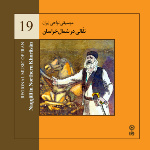- artist:Various Artists
- region:Indian Subcontinent
- release year:2007
- style(s):Folk
- country:Iran
- formats:Audio File / Digital, CD (Compact Disc)
- record posted by:Mahoor Institute of Culture and Arts
- label:Mahoor Institute of Culture and Arts
- publisher:Mahoor Institute of Culture and Arts
- buy this record
In Mashhad and Bojnurd during the late 1340s and early 1350s [late 1960s and early 1970s] patrons of tea-houses could hear daily performances by naqqâls who retold stories from the Shâhnâme and sang some of the verses. In conversation most naqqâls emphasized the social value of their art, which in their view made listeners aware of the highest standards of ethical conduct. Critics of Shânâme-khwâni regarded it as mere entertainement for unemployed men. After the Revolution of 1979, most tea-houses were closed and naqqâls lost their primary performance venue.
Two naqqâls who performed in Bojnurd, each morning from 9 or 10 until noon and every afternoon from 3 to 5 or 6, used printed books in the possession of their families; one was affliated with the Khâksâr order of darvishes. In Mashhad at least half a dozen naqqâls performed in the late morning, early afternoon or early evening, and most belonged to either the Khâksâr or the Shâh Ne`matollâhi order. Essential props in performances were a staff (`asâ) and a manuscript or printed abridgment of the Shâhmâme, although Ferdowsi's verses were recited from memory.
Each naqqâl inserted some of Ferdowsi's verses within his prose narration of the story, which was cast either in colloquial or in more literary language. The relative proportions of sung verse and spoken prose varied from one performance to another: although some naqqâls sang only a few verses, some performances consisted mainly of sung verse.



